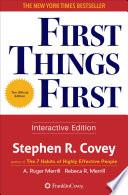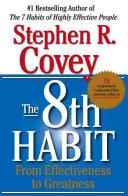
Works

The Seven Habits of Highly Effective People
Stephen R. Covey
First Things First
Stephen R. Covey
The 8th Habit: From Effectiveness to Greatness
Stephen R. CoveyFamous Stephen R. Covey Quotes

“Most people do not listen with the intent to understand; they listen with the intent to reply.”
Source: The Seven Habits Of Highly Effective People (1989), p. 239
Source: The 7 Habits of Highly Effective People: Powerful Lessons in Personal Change
Stephen R. Covey Quotes about people
“Ineffective people live day after day with unused potential.”
Source: The 7 Habits of Highly Effective People: Powerful Lessons in Personal Change
Source: The 7 Habits of Highly Effective People: Powerful Lessons in Personal Change
Source: The 8th Habit: From Effectiveness to Greatness
Source: The 7 Habits of Highly Effective People: Powerful Lessons in Personal Change
Source: The 7 Habits of Highly Effective People: Powerful Lessons in Personal Change
Stephen R. Covey: Trending quotes
Source: The Seven Habits Of Highly Effective People (1989), p. 101
“Admission of ignorance is often the first step in our education.”
Source: The 7 Habits of Highly Effective People: Powerful Lessons in Personal Change
As quoted in Teaching Sport and Physical Activity : Insights on the Road to Excellence (2003) Paul G. Schempp, p. 79
Stephen R. Covey Quotes
Source: The 7 Habits of Highly Effective People
Source: The 7 Habits of Highly Effective People
“Trust is the glue that holds everything together.”
Source: First Things First (1994), p. 243 <!-- Originally added as a paraphrase : The moment of making choice is the moment of truth! -->
Context: Trust is the glue that holds everything together. It creates the environment in which all of the other elements — win-win stewardship agreements, self-directing individuals and teams, aligned structures and systems, and accountability — can flourish.
“Give no answer to contentious arguments or irresponsible accusations.”
Source: Principle-Centered Leadership (1992), Ch. 11
Context: Give no answer to contentious arguments or irresponsible accusations. Let such things "fly out open windows" until they spend themselves.
“Retire from your job but never from meaningful projects.”
The 8th Habit : From Effectiveness to Greatness (2004)
Context: Retire from your job but never from meaningful projects. If you want to live a long life, you need eustress, that is, a deep sense of meaning and contribution to worthy projects and causes, particularly your intergenerational family.
The 8th Habit : From Effectiveness to Greatness (2004), p. 63
Source: Principle-Centered Leadership (1992), Ch. 11
Context: Unless we exercise our power to choose wisely, our actions will be determined by conditions. Our ultimate freedom is the right and power to decide how anybody or anything outside ourselves will affect us.
Source: First Things First (1994), p. 167
Source: The 7 Habits of Highly Effective People: Powerful Lessons in Personal Change
Source: The 7 Habits of Highly Effective People: Powerful Lessons in Personal Change
“Selfless service has always been one of the most powerful methods of influence.”
Source: Principle-Centered Leadership (1992), Ch. 11
Context: Perform anonymous service. Whenever we do good for others anonymously, our sense of intrinsic worth and self-respect increases. … Selfless service has always been one of the most powerful methods of influence.
“Let natural consequences teach responsible behavior.”
Source: Principle-Centered Leadership (1992), Ch. 11
Context: Let natural consequences teach responsible behavior. One of the kindest things we can do is to let the natural or logical consequences of people's actions teach them responsible behavior. They may not like it or us, but popularity is a fickle standard by which to measure character development. Insisting on justice demands more true love, not less. We care enough for their growth and security to suffer their displeasure.
The 8th Habit : From Effectiveness to Greatness (2004)
Context: Values are social norms — they're personal, emotional, subjective, and arguable. All of us have values. Even criminals have values. The question you must ask yourself is, Are your values based upon principles? In the last analysis, principles are natural laws — they're impersonal, factual, objective and self-evident. Consequences are governed by principles and behavior is governed by values; therefore, value principles!
p. 49
Source: First Things First (1994), p. 113
Context: It's not enough to have values without vision; you want to be good, but you want to be good for something. On the other hand, vision without values can create a Hitler. An empowering mission statement deals with both character and competence; what you want to be and what you want to do in your life.
principles such as fairness, kindness, respect, honesty, integrity, service, contribution. Different cultures may translate these principles into different practices and over time may even totally obscure these principles through the wrongful use of freedom. Nevertheless, they are present. Like the law of gravity, they operate constantly.
p. 47
The 8th Habit : From Effectiveness to Greatness (2004)
The 8th Habit : From Effectiveness to Greatness (2004)
Context: Values are social norms — they're personal, emotional, subjective, and arguable. All of us have values. Even criminals have values. The question you must ask yourself is, Are your values based upon principles? In the last analysis, principles are natural laws — they're impersonal, factual, objective and self-evident. Consequences are governed by principles and behavior is governed by values; therefore, value principles!
p. 49
“Are your values based upon principles?”
Source: The 8th Habit : From Effectiveness to Greatness (2004), p. 49
Context: Values are social norms — they're personal, emotional, subjective, and arguable. All of us have values. Even criminals have values. The question you must ask yourself is, Are your values based upon principles? In the last analysis, principles are natural laws — they're impersonal, factual, objective and self-evident. Consequences are governed by principles and behavior is governed by values; therefore, value principles!
Source: First Things First (1994), p. 12 <!-- Originally added as : Instead of taking two watches, take compass. It is not important how fast you are moving, but where you are moving. -->
Context: We present a dramatically different approach to time management. This is a principle-centered approach. It transcends the traditional prescriptions of faster, harder, smarter, and more. Rather than offering you another clock, this approach provides you with a compass — because more important than how fast you're going, is where you're headed.
The 8th Habit : From Effectiveness to Greatness (2004)
Context: Principles are universal — that is, they transcend culture and geography. They're also timeless, they never change — principles such as fairness, kindness, respect, honesty, integrity, service, contribution. Different cultures may translate these principles into different practices and over time may even totally obscure these principles through the wrongful use of freedom. Nevertheless, they are present. Like the law of gravity, they operate constantly.
p. 47
“To change ourselves effectively, we first had to change our perceptions.”
Source: The 7 Habits of Highly Effective People: Powerful Lessons in Personal Change
Source: The 7 Habits of Highly Effective People
“When the trust account is high, communication is easy, instant, and effective.”
Source: The 7 Habits of Highly Effective People: Powerful Lessons in Personal Change
“We see the world, not as it is, but as we are──or, as we are conditioned to see it.”
Source: The 7 Habits of Highly Effective People: Powerful Lessons in Personal Change
Source: The 7 Habits of Highly Effective People
“It's not what happens to us, but our response to what happens to us that hurts us.”
Source: The 7 Habits of Highly Effective People: Powerful Lessons in Personal Change
Source: The Seven Habits Of Highly Effective People (1989), p. 12
Source: The 7 Habits of Highly Effective People: Powerful Lessons in Personal Change
“Happiness, like unhappiness, is a proactive choice.”
Source: The 7 Habits of Highly Effective People: Powerful Lessons in Personal Change
“Habit is the intersection of knowledge (what to do), skill (how to do), and desire (want to do).”
Source: The 7 Habits of Highly Effective People: Powerful Lessons in Personal Change
Source: The 7 Habits of Highly Effective People: Powerful Lessons in Personal Change
Source: The 7 Habits of Highly Effective People: Powerful Lessons in Personal Change
“The ability to subordinate an impulse to a value is the essence of the proactive person.”
Source: The 7 Habits of Highly Effective People: Powerful Lessons in Personal Change
“We are not human beings on a spiritual journey. We are spiritual beings on a human journey.”
Pierre Teilhard De Chardin, in The Phenomenon of Man [Le Phénomène Humain] (1955); Covey quotes this in Living the 7 Habits : Stories of Courage and Inspiration (2000), p. 47
Variant: We are not human beings on a spiritual journey. We are spiritual beings on a human journey.
A paraphrase of De Chardin's statement which has also become misattributed to Covey.
Misattributed
Variant: We are not human beings having a spiritual experience; we are spiritual beings having a human experience.
“Courage is not the absence of fear but the awareness that something else is more important.”
Foreword to Prisoners of our Thoughts : Viktor Frankl's Principles at Work (2004), by Alex Pattakos, p. x
This statement has also been attributed to James Neil Hollingsworth (AKA: Ambrose Redmoon) in an article entitled "No Peaceful Warriors!" for Gnosis Magazine #21, in 1991.
Source: The 7 Habits of Highly Effective People: Powerful Lessons in Personal Change
“Live out of your imagination, not your history.”
As quoted in Wake-up Calls : You Don't Have to Sleepwalk through your Life, Love, or Career! (1992) by Eric Allenbaugh, p. 65
“Our behavior is a function of our decisions, not our conditions.”
Source: The 7 Habits of Highly Effective People: Powerful Lessons in Personal Change
“People simply feel better about themselves when they’re good at something.”
Source: The 8th Habit: From Effectiveness to Greatness
Source: The 7 Habits of Highly Effective People: Powerful Lessons in Personal Change
“People can't live with change if there's not a changeless core inside them.”
Source: The 7 Habits of Highly Effective People: Powerful Lessons in Personal Change
Source: The 7 Habits of Highly Effective People: Powerful Lessons in Personal Change
“How you treat the one reveals how you
regard the many, because everyone is ultimately a one.”
Source: The 7 Habits of Highly Effective People: Powerful Lessons in Personal Change
